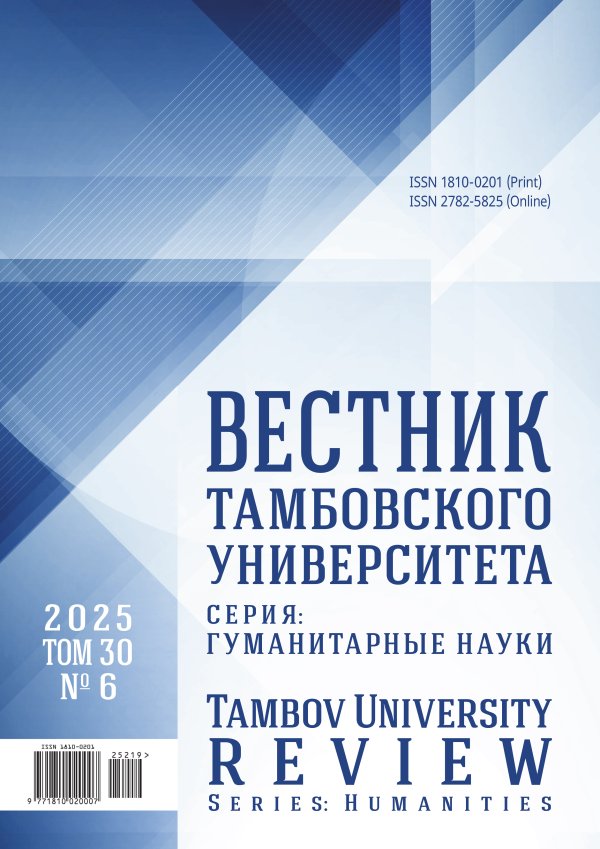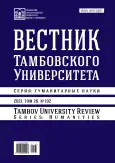Амурская область как территория гуманитарного взаимодействия
- Авторы: Мэйвэй Я.1
-
Учреждения:
- ФГБОУ ВО «Благовещенский государственный педагогический университет»
- Выпуск: Том 26, № 192 (2021)
- Страницы: 245-256
- Раздел: ОТЕЧЕСТВЕННАЯ ИСТОРИЯ
- URL: https://journal-vniispk.ru/1810-0201/article/view/298406
- DOI: https://doi.org/10.20310/1810-0201-2021-26-192-245-256
- ID: 298406
Цитировать
Полный текст
Аннотация
Исследование посвящено проблемам развития гуманитарного взаимодействия между регионами двух государств – Амурской области (РФ) и провинции Хэйлунцзян (КНР). Проанализировано развитие гуманитарных отношений между этими сопредельными территориями с конца 1980-х гг. и до настоящего времени. Рассмотрены основные нормативно-правовые акты межгосударственного и межрегионального уровней, повлиявшие на гуманитарное взаимодействие. Отмечены факторы, влияющие на развитие российско-китайских отношений в приграничье, связанные со сложной социально-экономической обстановкой реформ в России в 1990-е гг. Рассмотрена позиция руководителей Амурской области по отношению к развитию гуманитарных связей с соседним регионом КНР. Выделены основные направления гуманитарного взаимодействия Амурской области с приграничными территориями Китая (прежде всего, с провинцией Хэйлунцзян) в области туризма, в сфере культуры, спорта, а также в образовательном пространстве. Доказано, что развитие российско-китайских межгосударственных отношений с конца 1980-х гг. можно охарактеризовать как поступательное и стабильное. Сделан вывод об особенностях модели сотрудничества области с регионами КНР, о значительной роли географического положения области в развитии международного взаимодействия, а также о стабильности курса на сближение в области гуманитарного взаимодействия между двумя странами.
Об авторах
Я. Мэйвэй
ФГБОУ ВО «Благовещенский государственный педагогический университет»
Автор, ответственный за переписку.
Email: yanmeiwei1987@163.com
ORCID iD: 0000-0002-1518-6915
аспирант
675000, Российская Федерация, Амурская область, г. Благовещенск, ул. Ленина, 104Список литературы
- Дубровина О.В., Плотников В.С. Модель международного сотрудничества Амурской области России с регионами Китая // Власть. 2019. № 5. С. 93-100.
- Симутина Н.Л., Рыжова Н.П. Экономические и социальные взаимодействия на трансграничном пространстве Благовещенск-Хэйхэ // Вестник Дальневосточного отделения Российской академии наук. 2007. № 5. С. 130-144.
- Сун Куй, Чэнь Цюцзе. Чжун Э люйю хэцзо дэ хуэйгу юй чжаньван (Прошлое и будущее сотрудничества России и Китая в сфере туризма) // Сиболия яньцзю. 2001. № 5. С. 11-16. (Кит. яз., авт. перевод).
- Рисухина О.Н. Развитие культурных связей российского Дальнего Востока и Северо-Восточного Китая (середина 80-х гг. XХ – начало XXI в.) // Россия и АТР. 2014. № 3 (85). С. 38-52.
- Ларин В.Л. Российско-китайские отношения в региональных измерениях (80-е годы XX – начало XXI в.). М.: Восток-Запад, 2005. 390 с.
- Россия и Китай. Четыре века взаимодействия. История, современное состояние и перспективы развития российско-китайских отношений / под ред. А.В. Лукина. М.: Изд-во «Весь Мир», 2013. 704 с.
- Ян Лихуа. Шилунь Чжун-Э вэньхуа цзяолю юй хэцзо (О российско-китайских культурных обменах и сотрудничестве) // Сиболия яньцзю. 2013. № 2 (40). С. 49-52. (Кит. яз., авт. перевод).
- Ян Чжэнъян, Сунь Дунъян. Анализ стратегий развития культурных обменов между Хэйхэ и Амурской областью // Вэньхуа цзяолю. 2020. № 20 (165). С. 123-125. (Кит. яз., авт. перевод).
- Гуань Чанфу, Пэн Чуаньюн. Современная ситуация, проблемы и альтернативы культурных обменов между Хэйхэ и Россией // Сиболия яньцзю. 2013. № 2 (40). С. 46-48. (Кит. яз., авт. перевод).
Дополнительные файлы









